Welcome to the final instalment of the Daggerspell Reread and Review Series!
If you’re interested in learning more about Kate, me or this project, please take some time to read ‘Introducing: The Daggerspell Reread and Review Series, with Kate Elliott’, where we discuss our experience with Kerr’s work (None for me! Lots for Kate!), and our expectations for this reread/review series.
The second part of the project, we tackled a large chunk of Daggerspell, which covered the first 184 pages, and saw the most recognizably ‘epic fantasy’ conflict so far: a war between armies, a battle between mages (good and evil), and a beautiful woman falling in love with a (sorta) prince. Sounds cliche, but, as we’re learning about Kerr, nothing she writes is ever so simple as it seems.
Though Cullyn, Jill and Nevyn are at the heart of the conflict in that section of the book, it was Lovyan, mother of Rhodry and Rhys, that caught our attention. Kate said:
Look how neatly Kerr introduces an older woman: She is a noblewoman who through a completely realistic twist in the law (explained clearly by Kerr) is a ruler in her own right although she is subordinate to her own son (who is gwerbret, which I will define here as a lord who is of lesser rank than the king but who has a number of lords under his rule).
Lovyan does not swing a sword. She rules. She rules over a collection of lesser lords (all landed) with a full understanding of the ways in which her situation gives her power and the ways in which she has to carefully negotiate her position because she is a woman.
[…]
Lovyan proves herself as a good ruler even while Kerr makes it clear that her being a woman makes her situation precarious. Nor is her role seen as a one note role. She is frustrated by her inability to reconcile her feuding sons (an issue that will become central to the plot later), she engages with Nevyn because she understands that he is far more than the simple herbman he pretends to be, she shows kindness to Jill. And she is a little secret in her past, an affair she obviously has had to keep hidden all these years.
She is an older woman with agency and a full personality in a genre that gives characters like her short shrift. She is absolutely one of my favorite characters in the entire series.
So, join us while we discuss the ending to Daggerspell, reflect on one of Lord of the Rings‘ greatest lessons… and twist ourselves into Celtic Knots as we look back on the entire experience!
Spoilers Galore!
Sections Covered
Eldidd, 1062 (pp. 388-387, total 71 pages)
What Happens
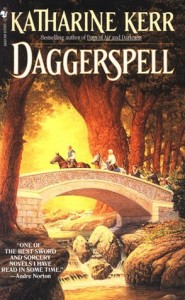 In the aftermath of the battle, and the calm that settles over Eldidd, not all is as peaceful as it seems. Rhodry, Levyan and co. are summoned by Rhys who wants to hear first hand of the actions taken by both sides in the rebellion. Rhys questions the legitimacy of Rhodry’s claim that dweomer was involved in the uprising and subsequent defeat of the rebellious men. Nevyn proves the existence of dweomer to Rhys, who immediately regrets his doubts, but Rhodry’s men are unsettled by Rhys’ distrust in their word. The rumblings of another rebellion start growing and Rhodry, offended by his brother’s actions, vows to leave the next morning, before anything bad should happen.
In the aftermath of the battle, and the calm that settles over Eldidd, not all is as peaceful as it seems. Rhodry, Levyan and co. are summoned by Rhys who wants to hear first hand of the actions taken by both sides in the rebellion. Rhys questions the legitimacy of Rhodry’s claim that dweomer was involved in the uprising and subsequent defeat of the rebellious men. Nevyn proves the existence of dweomer to Rhys, who immediately regrets his doubts, but Rhodry’s men are unsettled by Rhys’ distrust in their word. The rumblings of another rebellion start growing and Rhodry, offended by his brother’s actions, vows to leave the next morning, before anything bad should happen.
Nevyn and Aderyn continue their pursuit of the Dark Master, only to find out that s/he has fled out of reach.
With one final twist of the dagger, Rhys calls out his brother, condemning him for letting a woman fight in his place. Rhodry is overtaken with rage, battle-blindness, and begins to pull steel on his brother. He smartens up, but it is too late: Rhodry is detained and awaits a trial. Cullyn and Nevyn approach Rhys to save their friend, only to find out that Rhys has no intentions of killing his brother, only to humiliate him. The next day, Rhys offers Rhodry complete acquittal if he will only swallow his pride. Rhys and Rhodry butt heads, stubbornness ensues, and Rhodry refuses to bow to his brother. Appearing to have no other choice, Rhys sentences Rhodry to death. Cullyn, having extracted a promise from Rhys, reminds him that he’d given his word that he would not kill his brother. Rhodry is sentenced to exile.
After leaving the kingdom, with nothing but two pieces of coin and a silver dagger, flees the kingdom, alone. Pursued by overzealous bounty hunters, Rhodry’s life is saved by the Wild Folk, who were sent by Nevyn, and he escapes the country without further incident. To nobody’s surprise, Jill shows up in the final pages to join Rhodry in his exile.
Kate’s Final Thoughts
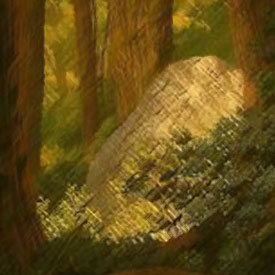 In many–perhaps most–fantasy novels, the book would end with the victory over the rebellious lords achieved with battle and with magic. It’s big, it’s satisfying, the good guys win.
In many–perhaps most–fantasy novels, the book would end with the victory over the rebellious lords achieved with battle and with magic. It’s big, it’s satisfying, the good guys win.
But that is not Kerr’s aim in Daggerspell. She is untangling a much larger story, one about the ways people harm and fail each other, which in the case of the Deverry books takes place over multiple lifetimes. She is dealing with lives and history as an unpacking of consequences, how actions have ripples that spread out through the years. In a way the lives of the individuals are a metaphor for the process of history.
One of the things I like about these books is that Kerr doesn’t feel the need to sort everything out quickly. I know that some people complain about multivolume novels but I think the multiple volumes are used to good effect here. Kerr doesn’t solve the problem in one go; the story is not neatly sorted out and tied up with a bow in a single volume; as with a knot, she can only unravel a bit at a time.
It has always seemed to me that there are three major ‘crimes’ in the original past life with Galrion and Brangwen. First and most important is Galrion not recognizing and taking seriously Brangwen’s gift because everything else falls out from that. Second and third are Gerraent’s unnatural love for his sister and his murder of his best friend, which comes about because Blaen confronts him (out of concern).
Clearly the issue of Brangwen’s gift–bringing her to ask to study the dweomer—is Nevyn’s great task, the one his life has been extended to bring about. But in the final section of Daggerspell the matter of Gerraent and Blaen and Gerraent and Brangwen is settled, rather than that of Brangwen’s gift.
Because this is the first book, we have not yet seen all of the lives Gerraent has lived — we’ve only seen two, but we can guess there are more to come in the later books. What we do see is that Cullyn is a strong enough man, a humble enough man, and an honorable enough man to break the chain. He gives up his claim to Jill although he has devoted his life to raising her; when he accepts Rhodry’s offer of captaincy he is restoring the close relationship of trust the men had before. Poor Nevyn has to sit back and watch it happen, see Jill taken away from him again although for very different reasons.
I like how Kerr has Cullyn save Rhodry’s life, thus restoring the balance for the life he took. It’s also a good bit of characterization since a man like Cullyn would have observed enough lords to understand the code that governs their behaviour, and it is that code of honor that saves Rhodry from Rhys’s anger and envy. It feels very believable.
I also find Lovyan so appealing in this section as we learn more about her past and see her caught between her two sons. Again, she is an example of how to write a believably complex and effective female character in a patriarchal society who functions fully within that society without being merely an adjunct to a male. Her status comes about partly because she married a gwerbret and is mother to a gwerbret but she also retains status from her birth family who have rank and lands of their own. In societies where kinship is central, women can have ties that give them authority and status. Lovyan is not a pawn but a power in her own right while still retaining the legal disadvantages of being a woman in a patriarchal society. It’s a superb portrait (and her smug memory of the love affair she had rounds it off nicely). As much as I love the other characters, Lovyan may be my favorite just because she is so rare in fantasy fiction. I wish there were more like her.
Aidan’s Final Thoughts
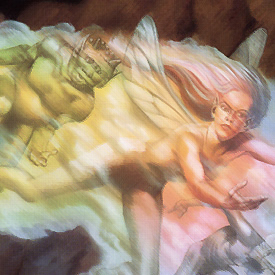 Wow. Like, wow.
Wow. Like, wow.
Endings are so bloody difficult to nail. Most of the time they come off feeling hollow, or rushed. An emotional explosion, then fade-to-black. Daggerspell avoids all of that with a denouement that appears to be a calm after the storm, but, as the final pages of the novel creep closer, is proven only to be the eye of the storm, with some riveting plot developments that rock the safe foundations that Jill, Rhodry, Lovyan and the rest of the characters thought they were sitting on.
Particularly effective is the ongoing relationship between Nevyn, Cullyn and Rhodry. Nevyn, by his own admission, stays out from the middle of this ego-triangle, but his effect ripples through the reunion between Blaen/Rhodry and Gerraent/Cullyn through his interactions with Jill. After searching for Brangwen/Jill for so long, it’s amazing to watch Nevyn sit back when he finds her, slowly building a relationship, against his burning desire to right every wrong he did against her in her previous life, and recognizes that her wyrd, and her path to finding dweomer, first must pass through the complicated relationship she has with her father, whose own wyrd is demanding many things of him as he tries, without knowing it, to reconcile with his own mistakes in the past, and her fledgling love with Rhodry, the same man that Nevyn was originally going to pass her along to, removing her from his path to mastering the dweomer. It shows a remarkable restraint in Nevyn, but also shows how much he has evolved from the time when the reader is first introduced to him. So much of Nevyn’s selfish decisions, made hastily, with little regard for the consequences of toying with the lives of his friends, are still sending shockwaves through the political landscape of Eldidd, and, in that time, he’s learned patience and respects that despite having his own place in the shape of the world, his wyrd is not Deverry’s wyrd.
That’s reserved for Rhodry. Which brings me to what I think is one of the most interesting aspects about Daggerspell. But first, bear with me while I write a bit about Lord of the Rings (’cause, seriously, can we really have a genre discussion without falling back to beating on that dead horse?)
I have an essay brewing in the back of my mind about Lord of the Rings. It’s not about Samwise the Hero, or Tolkien’s social commentary, or why Glorfindel should have carried the ring to Mordor. It’s about consequence.
Recently, Adam Callaway wrote an essay posing the question, “has fantasy forgotten the consequences of violence?” Kerr has not forgotten the consequences of violence, given how totally the rippling sadness of Brangwen’s death defines the core of Daggerspell. Callaway explores the necessity of violence in fantasy, but does so on a smaller scale, the effect it has on individuals (Myke Cole also has a tremendous essay on the effects and consequences of violence), but my brewing essay on Lord of the Rings is about the greatest lesson that it didn’t teach fantasy. That lesson? That consequence and the aftermath of world-altering conflicts is of enormous importance in allowing the reader to discover again what it was that the heroes were originally fighting for. The Ring falls into Mount Doom midway through The Return of the King, hundreds of pages before the novel is over. Why? So Tolkien can explore the consequences of Sauron’s greed and the heroism of Eowyn, Samwise, Gandalf and the rest of the good people who helped bring about his downfall. The Scouring of the Shire is one of the most important sequences in fantasy because the Hobbits are fighting without the aid of anyone bigger and stronger than them, and they’re fighting to something that is dearly important, right down to the core of their being. It’s one thing to fight for the survival of the world, it’s another entirely to fight for the survival of your home, your friends, your family.
Stop for a moment and think about some of the popular epic fantasies that have come out since Lord of the Rings. Now consider how many of them spend time exploring the consequences of the hundreds, or thousands, of pages that lead from their opening pages to their closing. Robert Jordan’s Wheel of Time has 684 chapters. Only a small handful happen after the final volume’s climactic battle. The final seventy pages of Daggerfall are all about consequence, and not everything is tied up nice and clean, just like Lord of the Rings. The good people win, but their problems are not washed away like sandy footprints under rolling surf.
Rhys’ exiling of Rhodry is interesting because it brings to the forefront the posturing and political division within the family. Though no one wants to see Rhodry killed, or even exiled, Rhys included, the demands of their political positions force their hands and cause Rhys’ jealousy and anger towards his brother to directly and dramatically affect Eldidd’s political landscape. Lovyan, as their mother, but also a political figure, is caught in the middle of it all. In the comments for the previous post, I wondered aloud about why I think this relationship is so important:
I’ve been thinking a lot about Lovyan recently, thanks to Kate’s original comments and the following discussion in this here in the comments, and it strikes me how deeply entwined inter-family politics is in Daggerspell.
Most striking, of course, is Jill and Cullyn, who’s incestuous relationship is the lynchpin for the entirety of the novel’s ongoing conflicts, but, most interesting to me, is the conflict between Rhys and his mother and brother. Until this point, Rhys has been off stage, acting as a villain through inaction, rather than direct actions against Rhodry, and it doesn’t take a rocket scientist to connect Rhys’ seemingly unfounded hatred for his brother (and apparent ambivalence for the tough situation he’s placing his mother in), is connected to whatever force was manipulating Loddlaen to act against Rhodry.
Two contesting brothers, locked in a passive war against one another for fears of ambition and succession, is nothing new to storytelling, but what really makes this plot line stand out is how Kerr puts Lovyan in the middle of the standoff as both an emotional stakeholder and a political stakeholder. Rhys’ actions towards his brother can be passed off as machismo, but the way he treats his mother, as a piece of a chessboard and a weapon against Rhodry, tells us more about him than any amount of screen time or direct action against Rhodry ever could have. Lovyan shows such strength in her response to the feud between her sons, and so cleverly and subtly influences that rippling political effects resonating outwards, that her role in the the Eldidd section of the novel is something that might go unnoticed by new readers who’re focussing on the Nevyn/Jill storyline, but are, in many ways, just as emotionally impactful and, presumably, important to the upcoming novels. It’s nice to see a female with political power that doesn’t rely on her ability to manipulate men into doing her dirty work.
Seeing Rhys, his hatred for his brother being exposed as jealousy, rather than tied into Rhodry’s wyrd and the Dark Master, being forced to play his hand by Rhodry’s pride, is a dagger to Lovyan’s heart and is, in many ways, a tragedy as deep and important to the novel as Brangwen’s death. Knowing what we do of Cullyn/Gerraent, it’s almost impossible to read the scene where he ultimately saves Rhodry’s life (by reminding Rhys of his promise to spare his brother’s life) without pumping a fist in the air and yelping with joy. Despite knowing that he will ‘lose’ Jill to Rhodry, he lets her go and rights the wrong he committed almost 400 years earlier. As a reader, this was incredibly satisfying, and a perfect bittersweet ending for an emotional rollercoaster of a novel.
Kate’s Farewell
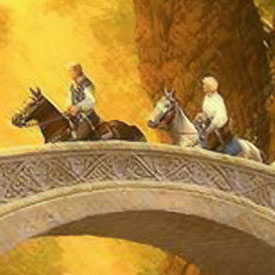 On finishing Daggerspell and reading this excellent commentary, my overwhelming response is to urge us all to start in on Darkspell (volume 2) because I know what is coming. As rich as the story appears after one volume, Daggerspell really only scratches the surface; the story deepens from here on out.
On finishing Daggerspell and reading this excellent commentary, my overwhelming response is to urge us all to start in on Darkspell (volume 2) because I know what is coming. As rich as the story appears after one volume, Daggerspell really only scratches the surface; the story deepens from here on out.
Aidan’s Farewell
I’d like to thank everyone who followed along with Kate and me on this re-read/review series. Whether you were new to the series (and as foolishly naive in your predictions as I was!), or a returning fan, you were part of a community discussion that extended so far beyond what Kate and I contributed… and that’s pretty cool. We were so impressed by the level of community interaction, that another re-read like this seems like an inevitability. I hope you’ll join along for that one, too!
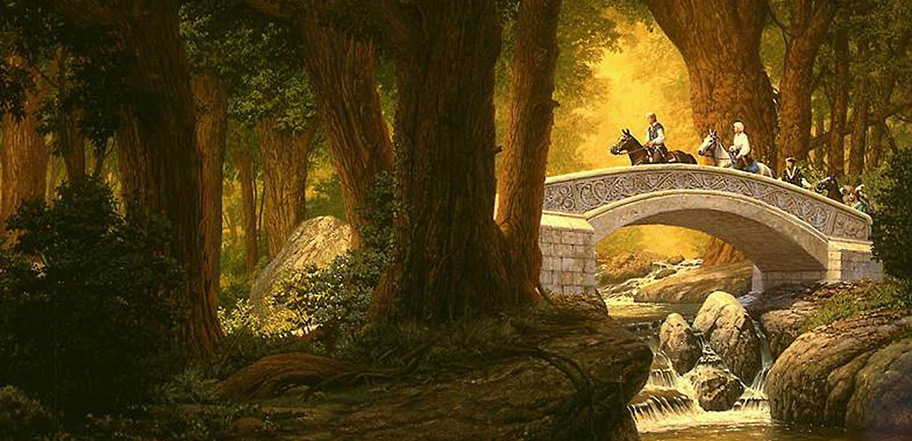


I very much hope that you do do a DARKSPELL reread. I’ve really enjoyed reading all the commentary and discussion and would love to see what people come up with for some of the developments in the next book.
To the major reconciliations both Kate and Aidan have mentioned: i.e. Gerraent/Brangwen, Gerraent/Blaen—I’d add the one I actually love best from this episode—Galrion/Gerraent. The way Nevyn and Cullyn come to terms with each other is unique, in part because they are so much more aware of what is really happening, but also because they start from such a different place. For the other two pairs, they start from a foundation of love that got twisted into hate by action and circumstance. But hatred Nevyn and Gerraent’s incarnations share has no history of affection to all back to, only hatred on the one side and puzzled indifference on the other. To me that makes their reconciliation all the more poignant and the moment where Nevyn realizes that he and Cullyn have in fact stepped past forgiveness into friendship profoundly moving.
Perhaps in part it’s because this particular reconciliation is especially hard-earned on both sides, from Cullyn’s starkly honest discussion with Nevyn to Nevyn’s humbling realization that much of what he has hated most in Gerraent are the traits (pride, stubbornness, youthful indifference to consequence) that he hates most in himself. In Cullyn he sees reflected his own struggle for self-mastery, self-awareness, and redemption and he finds that respects him for it. It’s only then that Nevyn is finally able to put his hatred for Gerraent to rest for good and a portion of his own self-hatred with it.
It’s also a fantastic portrait of what forgiveness looks like at its best. There’s a truism, often uttered, that forgiveness is as much for the sake of the one who forgives as the one forgiven. The truth of that is clear here: look at how close Nevyn comes to violating all his vows (and murdering Cullyn by inaction) earlier in the episode. Releasing his hatred of Gerraent, for Nevyn, closes an old and still-bleeding wound. But it is also clear that forgiveness cannot be offered in a vacuum. For the one sinned against to truly forgive, the sinner has to genuinely change, as has Cullyn has in fact done. And Cullyn, too, gains, because Nevyn’s respect and friendship, offered despite knowing Cullyn’s darkest secrets, is something Cullyn needs more than he wants to admit.
My only other major comment is that I think talking about either Nevyn or Cullyn ‘losing’ Jill to Rhodry is actually misleading if we consider the book’s ending. Jill chooses Rhodry and her freedom in a single act and the language Kerr uses suggests that these two choices, at this stage, aren’t really separable. This isn’t a matter of two men losing a woman to a third as if she’s a thing to be lost—as both Nevyn and Cullyn in the end see clearly. It’s a matter of two men who love Jill stepping back to let her find her own destiny without their interference. Equally difficult, I’d grant (perhaps more) but in the end quite different.
The thing I really liked about the ending of DaggerSpell is how well it served as both a fitting ending and as a ‘to be continued’ at the same time. You have the trope of the two lovers going off together into the sunset and this very trope pulling Jill away from the stability and security she would need to learn the dweomer from Nevyn
@Amanda. While I agree Jill is obviously her own woman and going off with Rhodry isn’t a tug of war between him, Nevyn and Cullyn; there is a aspect of loss for Nevyn especially. As I mentioned in my previous comment while Jill is off being the partner to a Silver Dagger she isn’t going to have the stable life she would need to become a dweomer master. Given that it now around 400 years Nevyn has been trying to find the opportunity to train her to get so close and have it blow up in his face must be immensely galling. And to me, having Jill learn the dweomer is really the central conflict of the first four Deverry books. Everything in true books either draws her further or nearer to that eventual goal.
And I think there is also a question of when Jill leaves, is she off with the man she loves, or is she running away from the strange and new life she would have as a woman of Lovyn’s household. Her life with Rhodry is a conuation of what is normal for her, but Dunn life would be full of people she doesn’t know and can’t easily escape from, and tasks she isn’t used to or is skilled at. So while leaving with Rhodry is the romantic choice, in a way it is the safe choice as well.
Hi Brendan,
Actually, I disagree, Brendan. Nevyn himself comments that the unsettled life will keep her talents alive, which means that from his point of view, he isn’t “losing her, but keeping her. ” Nevyn is playing the long game here. Jill is emotionally totally unready for training at this point, Rhodry or no Rhodry. Jill in a position where her talents will not fade is a reprieve, not a loss. Jill staying at court as Rhodry’s mistress would have meant her powers fading; then Nevyn really would have lost her for that lifetime.
I don’t think it is fair to characterize her leaving the life she would have had at Lovyan’s court as a “safe choice,” precisely. But I do think the fact that it is the romantic choice gives her license she needs to choose the life that will make her happy, over filial obligation and gratitude to Lovyan.
Rhodry and Rhys, I just want to knock their heads together and tell them to get over themselves and each other already. Lovyan didn’t strike me as strongly as she did others: she seems to be winding up for some really interesting scenes in future books though. Jill’s situation as a kept woman couldn’t possibly last long, and her breaking out of the cage at the end was a great relief. Her decision to run off with Rhodry seems far more impulsive than wise, and I wonder to what degree Kerr will explore her and Rhodry’s relationship after the infatuation has simmered down.
Nevyn must have seen Gerraent wreak havoc enough times over the years to instinctively distrust him, but letting that seep out, specifically when he made a face seeing Cullyn embracing Jill (in what I perceived as a fatherly way–Cullyn’s poisoned feelings didn’t seem to jump to the forefront until afterwards) was bad on his part. I’m glad that Nevyn sorted some things between himself and Cullyn, even thinking of him in mind as Cullyn rather than Gerraent. You can still grow up even at that age, eh? ;)
Cullyn’s (in Amanda’s words) “struggle for self-mastery, self-awareness, and redemption,” was the centerpiece of the last bits of this novel for me. He’s someone who self admittedly hasn’t been real big on introspection, but given the need to do so, he stepped up and did it and made the right decisions. So he ended up being my favorite. (Jill probably would have been if I’d read the book when it first came out.)
At first I found the omniscient narration a little off-putting, like the narrator or author was keeping me at arm’s length. You get tied down to third limited or first without realizing it, I guess! But once I got used to it, it was quite effective and the emotional parts of the story hit hard.
I like how the details of the world were divvied out with very little info-dump. I have a pretty good idea of the leadership structure, some of the social and sexual mores, the law system, the etiquette of battle, things people ate and drank, and so on, despite having not the slightest knowledge of any of the society/ies that formed the background. Not quite as solid on the landscape, though. I ended up finding a map online to figure out where some of the places were in relation to each other.
I doubt I’d have remembered this series existed without this read-along, so thanks to Kate and Aidan for hosting it. I’ll be heading back to Deverry soon, since there’s no way I can leave things as they are!